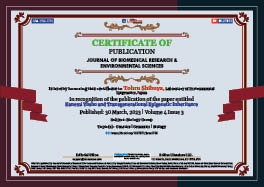Tohru Shibuya* and Yukiharu Horiya
Volume4-Issue3
Dates: Received: 2023-03-15 | Accepted: 2023-03-28 | Published: 2023-03-30
Pages: 543-545
Abstract
“Kanemi Yusho†was caused by the contamination of heated Polychlororinated Bisphenyls (PCBs) for deodorization in the manufacturing process of rice bran oil at the Kanemi Warehouse Co. Ltd., (Kokura-ward, Kitakyushu, Fukuoka, Japan) in 1968.People who ingested contaminated rice bran oil developed skin conditions, such as chloracne, which is characterized by black and white pustules, as well as liver and kidney diseases. A total of 15,000 peoples were affected. The sale of the contaminated rice bran oil was immediately banned, and it was concluded that the causative agent of “Kanemi Yusho†was Polychlorinated Dibenzofurans (PCDFs) derived from heated PCBs [1]. There toxicity are expressed after the activation by Aryl Hydrocarbon Receptor (AhR) [2].
FullText HTML
FullText PDF
DOI: 10.37871/jbres1708
Certificate of Publication

Copyright
© 2023 Shibuya T, et al. Distributed under Creative Commons CC-BY 4.0
How to cite this article
Shibuya T, Horiya Y. Kanemi Yusho and Transgenerational Epigenetic Inheritance. 2023 Mar 30; 4(3): 543-545. doi: 10.37871/jbres1708, Article ID: JBRES1708, Available at: https://www.jelsciences.com/articles/jbres1708.pdf
Subject area(s)
References
- Kuratsune M, Yoshimura H, Hori Y, Okamura M, Masuda Y (edis), Yusho: A Human Disaster by PCBs and related compounds. Kyushu University Press. 1996.
- Furue M, Ishii Y, Tsukimori K, Tsuji G. Aryl Hydrocarbon Receptor and Dioxin-Related Health Hazards-Lessons from Yusho. Int J Mol Sci. 2021 Jan 12;22(2):708. doi: 10.3390/ijms22020708. PMID: 33445793; PMCID: PMC7828254.
- Study group for treatment of Yusho in Japan (Leader Dr. G. Tsuji, Faculty of Medicine, Kyushu University: An interim report on the generational effects of Kanemi Yusho (in Japanese). 2022.
- Skinner MK. Environmental epigenetic transgenerational inheritance and somatic epigenetic mitotic stability. Epigenetics. 2011 Jul;6(7):838-42. doi: 10.4161/epi.6.7.16537. Epub 2011 Jul 1. PMID: 21637037; PMCID: PMC5703187.
- Skinner MK. Environmental stress and epigenetic trans-generational inheritance. BMC Medicine. 2014;12:153-157.
- Anway MD, Cupp AS, Uzumci M, Skinner MK. Epigenetic transgenerational actions of endocrine disruptors and male fertility. Science. 2005;308:1466-1469.
- van Cauwenbergh O, Di Serafino A, Tygat J, Soubry A. Transgenerational epigenetic effects from male exposure to endocrine-disrupting compounds: A systematic review on research in mammals. Clinic Epigenetics. 2020;12:65-87.
- Shibuya T, Horiya Y. Endocrine disrupting chemicals (EDCs) induce transgenerational epigenetic inheritance (TEI). Proceeding of the 49th Soc. Japanese Toxicology, Sapporo, Japan. 2022.
- Talia C, Connolly L, Fowler PA. The insulin-like growth factor system: A target for endocrine disruptors? Environ Int. 2021 Feb;147:106311. doi: 10.1016/j.envint.2020.106311. Epub 2020 Dec 18. PMID: 33348104.
- Gaspari L, Paris F, Kalfa N, Soyer-Gobillard MO, Sultan C, Hamamah S. Experimental Evidence of 2,3,7,8-Tetrachlordibenzo-p-Dioxin (TCDD) Transgenerational Effects on Reproductive Health. Int J Mol Sci. 2021 Aug 23;22(16):9091. doi: 10.3390/ijms22169091. PMID: 34445797; PMCID: PMC8396488.